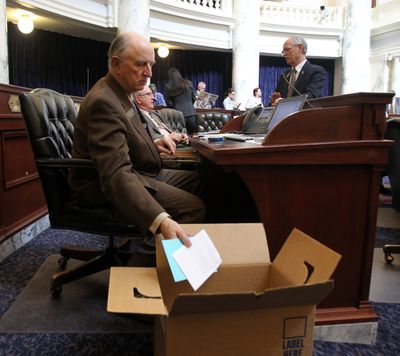Idaho Legislature wraps up with pay raises at the top

BOISE – The Idaho House balked at proposed raises for top state elected officials for the next four years on Thursday, trimming them back to 1.5 percent a year instead of 2.5 percent.
The move came as Idaho lawmakers wrapped up a 74-day legislative session, one day ahead of their target.
“That is a number that would enjoy support on the House floor,” said House Speaker Scott Bedke, R-Oakley.
State employees are getting average 2 percent merit-based raises next year, with half of that as a permanent increase and half as one-time bonuses. House Majority Leader Mike Moyle, R-Star, called the 1.5 percent figure for top officials “a fair compromise.”
The Senate already had passed the bill calling for the larger boosts for top elected officials. As the Legislature was pushing to wrap up its business, House members scrambled to amend the bill, pass it as amended, and get it back to the Senate for reconsideration all within a single day. The Senate passed the amended bill unanimously.
The action capped a long day in which lawmakers also approved a public schools budget with a 5.1 percent increase; allocated $400,000 to kill problem wolves next year; and approved a Medicaid budget with a 0.4 percent increase.
Both the House and Senate adjourned for the year moments before 7 p.m.
The session was Idaho’s shortest since 2004. “It’s been fast,” said Rep. George Eskridge, R-Dover.
The amendments to the pay bill still keep in place larger boosts next year for Idaho’s lieutenant governor and attorney general. Legislative leaders crafted those raises to tie the attorney general’s salary to that of district judges, and to boost a $35,700 lieutenant governor salary that reflected assumptions that the job was part-time when it’s closer to full-time.
Under the amendments, the governor’s salary would rise next year from the current $119,000 to $120,785, a 1.5 percent increase, and bump up another 1.5 percent in each of the next three years, to hit $126,302 on Jan. 1, 2018.
The secretary of state, state controller, state treasurer and state superintendent of schools all would see 1.5 percent raises next year as well, from the current $101,150 to $102,667, with additional 1.5 percent boosts the following three years.
The amendments don’t change the proposed salary for the attorney general, which would rise next year to $124,000, a 16 percent increase, and then stay frozen at that level through the end of the four-year term.
“Yes, that makes the attorney general for a year or two earn more than the governor,” Bedke told the committee.
Last year, Idaho’s salary for its attorney general was the 13th lowest in the nation; Washington’s attorney general was paid $151,718.